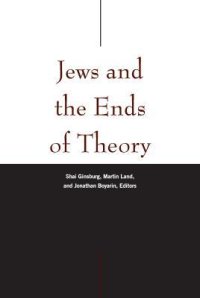
Ebook: Jews and the Ends of Theory
- Genre: Religion
- Tags: Jews Judaism Democracy Theory History Law Religion Religious Studies Politics Rabbinic Jews Israel Jewish
- Year: 2019
- Publisher: Fordham University Press
- Edition: Hardcover
- Language: English
- pdf
Jews and Marxism; Jews and the avant-garde; Jews and modernism; Jews and the nation; Jews and “abstraction”—the linkage between Jewishness and critical theory lurks, under various rubrics, in the history of Europe’s world, the collapse of that world in the near-century following World War I, and the fleeting transfer of world dominance to the United States. But what are the relationships between Jews, Jewishness and theory now? How has the figure of the Jew shaped Eurocentric or Americentric theory’s discourses on colonialism? And how do we think (implicitly or explicitly) or, more prescriptively, how should we think and talk about Jews and theory, when the promises of European modernity lie in wreckage around us as around its former colonies, when US cultural dominance appears on the wane, yet what will replace these is not yet clearly on the horizon? This book explores a series of questions about the relationship between Jews and theory now. First: what role does the figure of ‘the Jew’ (or ‘Jews’) play in contemporary theory? For at least a century and a half (a not entirely arbitrary starting point is Marx’s “Essay on the Jewish Question”) such figures occupied a privileged place in theory. Is there any sense in continuing to privilege such figures? If so, what work would they do? What are the possible and actual relations between theory and “Jewish Studies”? How has the theoretical figure of 'the Jew' shaped the encounter, both real and figurative, between Jews and Arabs in general, and between Jews and Palestinians in particular. Second: since the late 19th century, Jewish intellectuals have been disproportionately represented in the discourse of European and American theory. The cohort that has succeeded them appears to be more ethnically diverse. How might we understand the figure of “the Jewish intellectual” in the aftermath of these giants? Third: how does the notion of the “end of theory” (related, to varying degrees, to discourse on “the end of politics” or even “the end of history”) play into these questions? How, if in any significant way at all, is it related to the changing or disappearing figure of the Jewish intellectual, or of Jewishness in theory? Is it worthwhile to think the notion of end “Jewishly,” as a reflection about Jews in theory? Far from being merely retrospective, Jews and the Ends of Theory aims to relaunch and refocus these discussions for the decades to come.
Download the book Jews and the Ends of Theory for free or read online
Continue reading on any device:

Last viewed books
Related books
{related-news}
Comments (0)